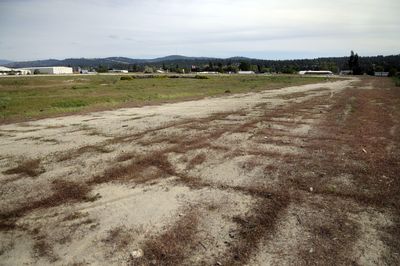City may sell Playfair property at loss
Top offer comes from Valley manufacturer

The city’s gamble on the former horse track it bought in 2004 is poised to become a short-term loser.
But in the long run, city officials say, selling the track – even at a loss – could be more like a jackpot for east Spokane, bringing jobs and development.
“The longer we put this off, the longer we don’t get any revenue out of it,” City Council President Joe Shogan said.
The city is reviewing offers to purchase part of Playfair in East Central Spokane. The city paid $6.3 million for 63 acres of Playfair in 2004 and will keep 18 acres for a storm water storage project.
The city last year requested formal bids to buy Playfair’s remaining 45 acres. Only one bid was received – from SCAFCO, a Spokane Valley-based steel-framing and grain-storage manufacturer. The sale fell through, even though the bid met a required minimum of $5.1 million, because SCAFCO demanded that the city pay to create sewer and street infrastructure on the site.
The new offers don’t meet the earlier minimum bid created by the council. Public Works Director Dave Mandyke said the new top offer again came from SCAFCO. But under the new deal, SCAFCO would pay to build roads and other public infrastructure on the site.
“The numbers hold together very closely,” Mandyke said.
Mandyke said the company initially hopes to bring about 100 jobs to the property by moving its steel-framing operations. Eventually, SCAFCO would move its grain-storage business and may develop part of the land for other companies.
Jim Hanley, of the East Spokane Business Association, said the group hopes the city will sell the property to SCAFCO. The business is growing and will be a good neighbor that will bring jobs to the community, he said.
“We can’t think of a better business to go in there than SCAFCO,” said Hanley, general manager of ACME TV Home & Office.
Former Mayor Jim West promoted the land’s purchase to build a sewage plant in partnership with Spokane County. But negotiations with the county soured soon after the land was purchased, and the county bought the nearby former stockyards property to build its own plant.
Councilman Bob Apple said it’s better to wait to sell the property until the market improves.
“We’ve got to get the minimum back,” Apple said in an interview earlier this month.
But several City Council members say depending on the details, they’re inclined to sell the land even if it’s less on a per-acre basis than the city paid in 2004.
“I’d like to see us get a good, competitive bid and put that land back to work for our city and our citizens,” City Councilman Mike Allen said.
City Councilman Al French, who previously argued that the land – bordered by Burlington Northern-Santa Fe and Union Pacific rail lines – would be best used for a train-loading center, said this week that he supports selling the property even if it’s not used for a transportation center.
“There wasn’t enough support for it, so there was no reason to pursue it,” French said.
Mayor Mary Verner said last year’s attempt to sell the land indicates that the city likely won’t earn a profit from the site.
“We got one bid. I think that speaks for itself as to what the market will bear,” Verner said earlier this month. “By the time we were at the point of trying to negotiate a final deal with the one bidder, the economy had continued to turn.”